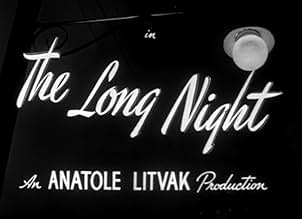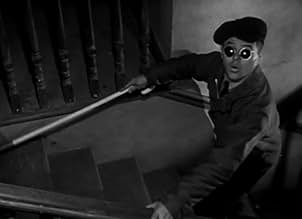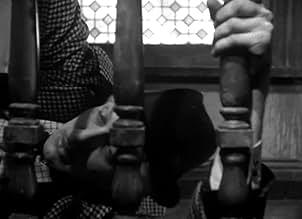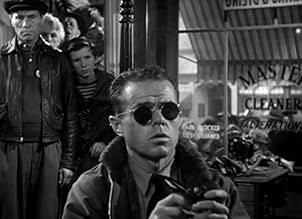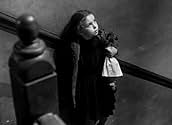AVALIAÇÃO DA IMDb
6,5/10
2,2 mil
SUA AVALIAÇÃO
Adicionar um enredo no seu idiomaPolice surround the apartment of apparent murderer Joe Adams, who refuses to surrender although escape appears impossible. During the siege, Joe reflects on the circumstances that led him to... Ler tudoPolice surround the apartment of apparent murderer Joe Adams, who refuses to surrender although escape appears impossible. During the siege, Joe reflects on the circumstances that led him to this situation.Police surround the apartment of apparent murderer Joe Adams, who refuses to surrender although escape appears impossible. During the siege, Joe reflects on the circumstances that led him to this situation.
- Direção
- Roteiristas
- Artistas
- Prêmios
- 4 vitórias no total
Melinda Byron
- Peggy
- (as Patty King)
Davis Roberts
- Freddie
- (as Robert A. Davis)
Fred Aldrich
- Ticket Taker
- (não creditado)
Murray Alper
- Mac - Bartender
- (não creditado)
Bobby Barber
- Nightclub Patron
- (não creditado)
Vangie Beilby
- Audience Member
- (não creditado)
Brooks Benedict
- Audience Member
- (não creditado)
Gladys Blake
- Millie - Saloon Waitress
- (não creditado)
- Direção
- Roteiristas
- Elenco e equipe completos
- Produção, bilheteria e muito mais no IMDbPro
Avaliações em destaque
Holed up in his apartment after committing a murder, a depressed war veteran engages in a gun battle with the police while reflecting on the circumstances that led to the situation. It sounds intriguing on paper, but the script is rather sloppy, featuring flashbacks within flashbacks. It's basically an uninteresting story with dull characters. Fonda tries to make something of his role, but is given little to work with. Bel Geddes makes an impressive film debut, and Dvorak and Price are also fine, but they are all let down by the screenplay. Litvak has made better films, but here his staging of police work and the shootout is poorly executed.
I wouldn't say The Long Night is a great film, and if anything it only peaks my interest more to see how much more classic the film it's based on is- Marcel Carne's La Jour se Leve. But for the time it ran, I was mostly glued to the screen, and got wrapped up in the plight of Henry Fonda's character Joe, and his predicament of his downfall from normalcy. It probably isn't very original, taking aside its connection with the French source; it's about a factory worker, very nice guy, who falls in love with a woman whom, he finds out, was an orphan just like him. But one night he follows her to a bar, sees her cavorting sort of with a sleazy magician (Vincent Price), and his perfect image of her is shattered, and grows only darker after he meets him (he first tells Joe he's her father, which is a truly great scene between two huge stars of classic film), and when she tells him about her history with him.
While I could never take my eyes off the screen, it should be said that for all of the strong craftsmanship with the picture (it's one of the finest photographed 'noirs' of the late 40s, especially for those stark scenes of Joe alone in his room with the whole town on the street calling for him) and for all of the tremendous talent in front of the camera- besides Fonda and Price, who the former it's a splendid and rewarding if not best-ever performance and for the latter a triumph of playing sneaky and villainous, the girl playing Jo Ann (Barbara Bel Geddes) is very good- it only works up to a point. I was engrossed the most in the last twenty minutes or so, as the film revved up its pace and tempo to the "will Joe or won't Joe" beat. Before that, it's many scenes that mostly rely on the presence of the actors to uplift the material past the breezy and conventional air of the dialog. There's nothing especially "wrong" with the material, but it doesn't go anywhere aside from hitting its main points.
The Long Night is something of a minor lost marvel- only recently did it come out on DVD in an OK print- and for Fonda and Price fans its a can't-miss kind of picture. Just don't go expecting anything that will change your perception of what film-noirs can go that don't go for the easy routes.
While I could never take my eyes off the screen, it should be said that for all of the strong craftsmanship with the picture (it's one of the finest photographed 'noirs' of the late 40s, especially for those stark scenes of Joe alone in his room with the whole town on the street calling for him) and for all of the tremendous talent in front of the camera- besides Fonda and Price, who the former it's a splendid and rewarding if not best-ever performance and for the latter a triumph of playing sneaky and villainous, the girl playing Jo Ann (Barbara Bel Geddes) is very good- it only works up to a point. I was engrossed the most in the last twenty minutes or so, as the film revved up its pace and tempo to the "will Joe or won't Joe" beat. Before that, it's many scenes that mostly rely on the presence of the actors to uplift the material past the breezy and conventional air of the dialog. There's nothing especially "wrong" with the material, but it doesn't go anywhere aside from hitting its main points.
The Long Night is something of a minor lost marvel- only recently did it come out on DVD in an OK print- and for Fonda and Price fans its a can't-miss kind of picture. Just don't go expecting anything that will change your perception of what film-noirs can go that don't go for the easy routes.
Henry Fonda goes through "The Long Night" after committing murder in this 1947 film noir directed by Anatole Litvak and also starring Vincent Price, Ann Dvorak and Barbara Bel Geddes. Fonda plays Joe, a returning veteran, now a blue collar worker who falls in love with young, pretty fellow orphan Jo Ann (Bel Geddes), only to come up against Price. Price plays Maximilian, a creepy magician with a show that features dogs and Charlene (Ann Dvorak). At first, Maximilian asks Joe to stay away from Charlene because she's his long-lost daughter and he wants better for her. From Charlene, Joe learns the truth - Maximilian is not her father, and she's attracted to his worldliness - though she claims to love Joe. Depressed, he turns to the sexy Charlene, his heart still with Jo Ann. During a fight in his apartment, he shoots Maximilian, and spends the entire movie under siege in his apartment as he relives in flashback and flashback within flashback what led him to this moment.
Litvak, a talented director, stages this film in an interesting manner - it begins with a blind man (Elisha Cook Jr.) stumbling across the body of Maximilian in the hallway of the apartment building where he lives. Joe will not leave his room, and the police work throughout the film to get him out. The photography and direction capture the darkness and drabness of Joe's surroundings, the cheapness of the nightclub where Maximilian performs, and focuses a harsh light on Charlene's room and Charlene herself.
Despite all of this great style, the film has a cheesy quality; the characters aren't really likable except for poor Joe; and the motivations of the characters aren't fully fleshed out, so the story ultimately doesn't make it. The acting is very good - Fonda shows us some still waters that run pretty deep in an excellently crafted performance. He's sexy as all get-out, too, when he lays down on Charlene's bed and smiles. Dvorak does a great job as a brittle Charlene, and Price is a complete sleazebag as the cruel Maximilian. Bel Geddes is incredibly young - this is her first film, and though she was 24 or 25, she looks and acts about 18, which is appropriate for this small-town, inexperienced girl.
"The Long Night" has some interesting elements, but because of a spotty script, we're not invested enough in the film for it to be really intriguing or exciting.
Litvak, a talented director, stages this film in an interesting manner - it begins with a blind man (Elisha Cook Jr.) stumbling across the body of Maximilian in the hallway of the apartment building where he lives. Joe will not leave his room, and the police work throughout the film to get him out. The photography and direction capture the darkness and drabness of Joe's surroundings, the cheapness of the nightclub where Maximilian performs, and focuses a harsh light on Charlene's room and Charlene herself.
Despite all of this great style, the film has a cheesy quality; the characters aren't really likable except for poor Joe; and the motivations of the characters aren't fully fleshed out, so the story ultimately doesn't make it. The acting is very good - Fonda shows us some still waters that run pretty deep in an excellently crafted performance. He's sexy as all get-out, too, when he lays down on Charlene's bed and smiles. Dvorak does a great job as a brittle Charlene, and Price is a complete sleazebag as the cruel Maximilian. Bel Geddes is incredibly young - this is her first film, and though she was 24 or 25, she looks and acts about 18, which is appropriate for this small-town, inexperienced girl.
"The Long Night" has some interesting elements, but because of a spotty script, we're not invested enough in the film for it to be really intriguing or exciting.
9tavm
When I went to my local library to check some DVDs, I stumbled onto this obscure flick that starred Henry Fonda, Barbara Bel Geddes (in her film debut), Vincent Price, and Ann Dvorak. With that cast (I just remembered that Elisa Cook, Jr. has a memorable role as a blind man here), with Anatole Litvak as director, and Dimitri Tiomkin conducting his score (as well as some Beethoven pieces spread among it), I expected an excellent suspenseful movie and I got it! Well, maybe nearly so since the speech Ms. Bel Geddes says to Fonda at the end is obviously contrived to address the audience as well as the leading character about the faith of people. Otherwise, the dialogue was mostly spot-on especially the heated exchanges between Fonda and Price who, as usual, is absolutely charming even in his creepiness. And Ms. Dvorak marks a nice contrast with her cynicism as compared with Ms. Bel Geddes' optimism. Fonda himself goes the full range of emotions whether during the flashbacks or his present condition of being holed up in his apartment while the police are waiting outside. So for all that, I highly recommend The Long Night.
I don't like remakes--and that is why I waited so long to watch "The Long Night". Originally it was a dandy French film ("Le Jour Se Leve") and I saw no reason to redo the film, as the original was quite good. And, after seeing it, I stick by my original opinion--there just wasn't a need to make this remake. However, I can understand why they made it, as folks in the States back in the 1940s did not watch foreign films--and when they saw this American version, it did seem original. But now with DVDs, Turner Classic Movies and Netflix, you should just stick with "Le Jour Se Leve".
The film is a talky picture about a brooding guy (Henry Fonda), his sweetie-pie (Barbara Bel Geddes) and a completely bizarre blabber-mouth (Vincent Price). Fonda and Bel Geddes are in love but Price is determined to break them up--and push Fonda to the breaking point. The story is told through flashbacks and is similar to the Jean Gabin film--without the film noir camera-work and lighting. Also, the American version comes off as much talkier--much. All in all, not a terrible film at all--but not the 9 that the other film deserved when I rated it a couple years ago.
The film is a talky picture about a brooding guy (Henry Fonda), his sweetie-pie (Barbara Bel Geddes) and a completely bizarre blabber-mouth (Vincent Price). Fonda and Bel Geddes are in love but Price is determined to break them up--and push Fonda to the breaking point. The story is told through flashbacks and is similar to the Jean Gabin film--without the film noir camera-work and lighting. Also, the American version comes off as much talkier--much. All in all, not a terrible film at all--but not the 9 that the other film deserved when I rated it a couple years ago.
Você sabia?
- CuriosidadesFilm debut of Barbara Bel Geddes. She was signed to a seven-year contract with RKO after this film. Director Anatole Litvak cast her after seeing her on Broadway as the female lead in "Deep Are the Roots", which played at the Fulton Theatre for 477 performances beginning 26 September 1945.
- Erros de gravaçãoWhen Joe from inside his apartment shoots at the cops who are standing outside his door; it leaves bullet holes in the door. But on a following cut after speaking with the little girl and going back into his apartment; there are no bullet holes on the interior side of the door.
- Citações
Maximilian: [to Jo-Ann] You have sharp nails like a little animal. Maybe that's what I like about you.
- Cenas durante ou pós-créditosOpening card: "...the night is long That never finds the day..." William Shakespeare, Macbeth, Act IV, Scene III
- ConexõesFeatured in Henry Fonda: The Man and His Movies (1982)
Principais escolhas
Faça login para avaliar e ver a lista de recomendações personalizadas
- How long is The Long Night?Fornecido pela Alexa
Detalhes
Bilheteria
- Faturamento bruto nos EUA e Canadá
- US$ 1.000.000
- Tempo de duração1 hora 41 minutos
- Cor
- Proporção
- 1.37 : 1
Contribua para esta página
Sugerir uma alteração ou adicionar conteúdo ausente

Principal brecha
By what name was Noite Eterna (1947) officially released in India in English?
Responda

